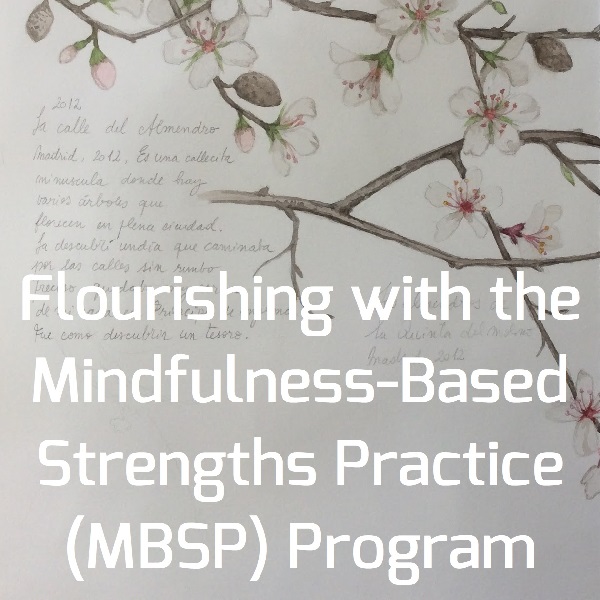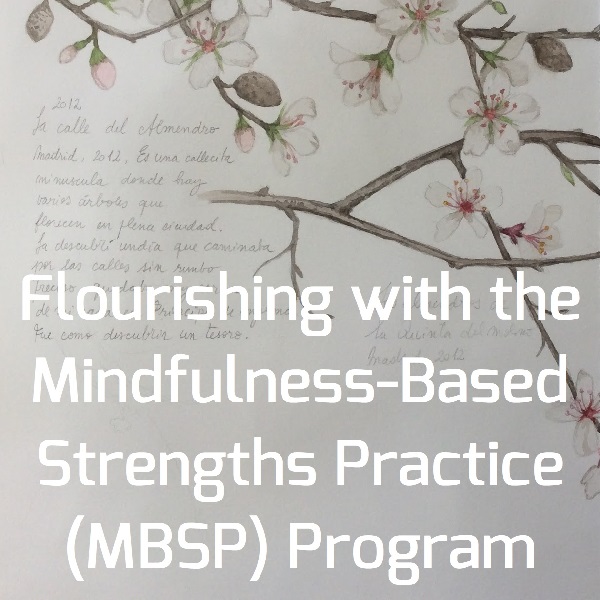Recent research conducted at the Department of Psychology, University of Zurich, Switzerland, confirm positive relationships between mindfulness and character strengths. This adds to the fact that numerous studies confirm the robust relationships between well-being and mindfulness or character strengths, respectively. Subscribe to our newsletter.
Positive psychology is interested in investigating how communities and individuals can flourish and thrive (Peterson, 2006). From the very initial works of Seligman (2002) positive character is one of the 3 pillars of this new discipline, together with positive emotions and positive institutions. Peterson and Seligman (2004) proposed a comprehensive system of 24 positive character traits known and the Values in Action (VIA) Inventory of character strengths which were considered universal across time and different cultures.
These 24 positive character strengths traits can be easily measured taking the VIA Survey, and the resulting strengths profile can be seen as a representation of a psychobiological model of personality consisting of three dimensions: (1) self-directedness, which maps onto concepts such as self-esteem and self-efficacy (emotional intelligence); (2) cooperativeness, which expresses the capacity to be empathic, tolerant, and compassionate (social intelligence); and (3) self-transcendence, which measures the tendency toward spirituality and creativeness (wisdom and meaning).
It is well known today that mindfulness programs and regular mindfulness practices are effective for the treatment of stress (Kabat-Zinn, 1990) and mental disorders (Segal et al. 2002, 2013). Recent studies show that mindfulness programs have also a significant positive impact in the personality profiles of healthy individuals, implying that, in addition to increasing well-being conditions, mindfulness practices have a positive effect in the development of the subjacent character strengths (Campanella et al. 2014).
Mindfulness and Character Strengths. A Practical Pathway for Flourishing
The results of the 8-week in-person Mindfulness-Based Strengths Practice (MBSP) workshop that took place recently in Lausanne, Switzerland (See our July 16, 2019 blog post Introducing Mindfulness-Based Strengths Practice (MBSP) in Switzerland) are in line with the scientific research findings presented above. The analysis of the feedback forms of this MBSP workshop shows positive effects on the participants’ evaluation of their own flourishing and transformation.
The biggest impact of this MBSP workshop was in the increased sense of identity of the participants (Character strengths awareness, balanced use, development, and expression – leading to flourishing) followed by the increased ability to manage problems with character strengths as a resource (Reframing/Positive reappraisal coaching exercises proposed – leading to mindful transformational change). In summary, we could experience that applying mindfulness to the development of character strengths with the wholistic approach that characterizes the MBSP workshop (Which encompass soma, body-mind consciousness, emotions, speech, thoughts, actions, and insight) is an impactful flourishing and transformative active learning endeavor.
Zen Wisdom, Positive Psychology and Neuroscience
Mindfulness roots are in Yoga and Buddhism. These disciplines and positive psychology are similar in their function of transforming ordinary living into a richer and more mature experience, promoting well-being, meaning and a fulfilling life (Levine, 2009). The well-being effect of mindfulness practices is not new for meditation practitioners. Already in the 4th-century CE the Yogacara Buddhist psychology school studied cognition, perception, and consciousness through the interior lens of meditative practices, and elaborate a psychological therapeutic system that mapped out the problems in cognition along with the antidotes to correct them (Lusthaus). Zen Master Thich Nhat Hanh, a living authority in this Yogacara tradition, published an enlightening commentary of the original Vasubandu’s Yogacara verses (Nhat Hanh, 2006). Such actualized Buddhist psychology, free of exotic and religious mysticism, provides the appropriate intellectual and practical framework for a positive psychology based on a model of the functioning of our body-mind (Levine, 2009), and for a practical neuroscience of well-being (Hanson, 2009).
Thanks to neurosciences we know today that focusing in positive resources and strengths is essential for health, well-being and performance (Hanson, 2013). Self-directed neuroplasticity allows changing the brain for the better voluntarily. Thanks to this neuronal capability character strengths can be cultivated voluntarily over time through positive experiences. This is also what the MBSP workshop is about.
A Personal Perspective on Mindfulness and Character Strengths
The relationship between mindfulness practices and character strengths development is two way. Mindfulness contributes to develop character strengths, which in turn contributes to develop a stronger mindfulness practice. Understanding this interaction creates renewed opportunities for bringing together both positive psychology and neuroscience with Zen wisdom. From his origins, but also during his maturation process, Buddhism has been made from non-Buddhist components. I believe such constructionist interbeing will continue and perpetuate thanks to the minds, hearts and actions of mindfulness practitioners engaging with life fully, openly and wisely, with a servant leadership attitude. I am also convinced that Buddhists, psychologists and neuroscientists, and generally anyone interested in a sustainable and mature human well-being, do share many foundational principles and will beneficiate from each other wisdom, methods, research, and experiences. I have found this hypothesis particularly relevant for Zen coaching (Gallifa, 2018).
2020 Mindfulness-Based Strengths Practice (MBSP) Workshops in Switzerland
Following the success of the first MBSP workshop organized in Switzerland in 2019, more workshops are planned for 2020. The first Mindfulness-Based Strengths Practice (MBSP) workshop in 2020 will take place in Lausanne, at l’Assise, starting January 31, 2020. Free information sessions will be offered December 6, 2019 and January 17, 2020. More information at www.gallifa.ch and enrollment at info@gallifa.ch.
Mindfulness-Based Strengths Practice (MBSP) is a new program developed by Dr. Ryan M. Niemiec (2013) at the VIA Institute on Character. MBSP brings together the latest science of mindfulness and character strengths into an active learning experience to help people flourish by getting in conscious contact with their inner strengths (e.g., social intelligence, leadership, teamwork, creativity, honesty, bravery, perspective, hope, etc.).
This evidence-based mindfulness and positive psychology program introduces the art of developing sustainable well-being through mindful character strengths balanced use proposing a blending of practical exercises, different types of body-mind practices, dyad discussions, and group sharing.
This intensive 8-week MBSP workshop is for people aiming to flourish by developing strengths awareness and a better sense of resourceful identity, as well as increasing positive emotions and relationships, life and work engagement, purpose, accomplishment, resilience, and health.
Jaume Gallifa, MBA, ACC, is the Managing Director of Gallifa & Partner LLC, a professional services company specialized in transformational change and flourishing. He can be reached at jaume.gallifa@gallifa.ch or via LinkedIn.
[accordion align=”” numbers=”false” first_one_open=”true”]
[pane title=”Flourishing with Mindfulness-Based Strengths Practice (MBSP). An 8-week in-person program starting on Friday, January 15, 2021 in Basel, Switzerland”]
MBSP brings together the latest science of mindfulness and character strengths into an active learning experience to help people flourish by getting in conscious contact with their inner strengths.
The brochure attached contains detailed information about the 8-week in-person MBSP program that will take place in Basel, Switzerland, starting on Friday January 15, 2021 at 18h at Zentrum für Achtsamkeit Basel/Center for Mindfulness Basel.
Thematic and info workshop sessions to learn more and experience the integration of mindfulness and character strengths for flourishing are offered regularly. Details and inscriptions at the Lausanne event page or the Basel event page.
[/pane]
[/accordion]
References
– Campanella, Fabio, Crescentini, Cristiano, Urgesi, Cosimo, & Fabbro, Franco (2014). Mindfulness-oriented meditation improves self-related character scales in healthy individuals. Comprehensive Psychiatry, 55, 1269–1278.
– Gallifa Maqueda, Jaume (2018). Zen Coaching: Coaching for Well-Being.
– Hanson, Rick (2009). Buddha’s Brain: The Practical Neuroscience of Happiness, Love, and Wisdom.
– Hanson, Rick (2013). Hardwiring Happiness: How to Reshape Your Brain and Your Life.
– Kabat-Zinn, John. (1990). Full catastrophe living.
– Levine, Marvin (2009). The Positive Psychology of Buddhism and Yoga.
– Lusthaus, Dan, What is and isn’t Yogacara, http://www.acmuller.net/yogacara/articles/intro.html.
– Nhat Hanh, Thich (2006). Understanding Our Mind: Fifty Verses on Buddhist Psychology.
– Niemiec, Ryan M. (2013). Mindfulness and Character Strengths: A Practical Guide to Flourishing.
– Pang, Dandan & Ruch, Willibald (2019). The Mutual Support Model of Mindfulness and Character Strengths. Mindfulness. August 2019, Volume 10, Issue 8, pp 1545–1559.
– Peterson, Christopher & Seligman, Martin (2004). Character Strengths and Virtues: A Handbook and Classification.
– Peterson, Christopher (2006). A primer in positive psychology.
– Segal, Zindel V. J., Williams, Mark G. & Teasdale, John D. (2002). Mindfulness-Based Cognitive Therapy for Depression: A New Approach to Preventing Relapse.
– Segal, Zindel V. J., Williams, Mark G. & Teasdale, John D. (2013). Mindfulness-Based Cognitive Therapy for Depression: A New Approach to Preventing Relapse. Second Edition.
– Seligman, Martin (2002). Authentic Happiness: Using the new positive psychology to realize your potential for lasting fulfillment.



